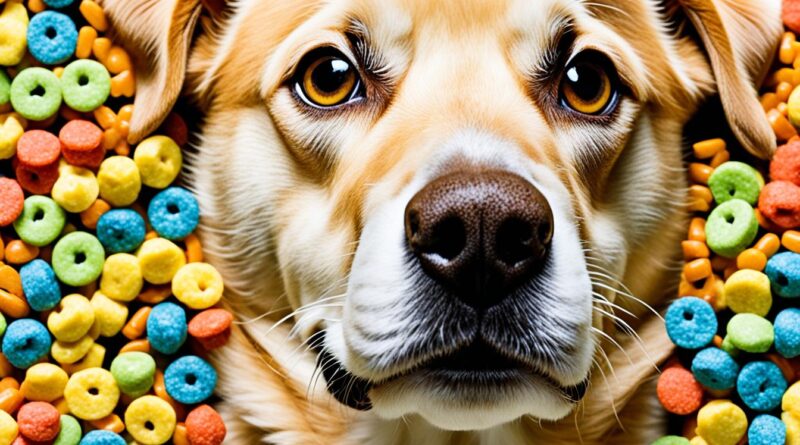Can Dogs Eat Rice Krispie Treats? Find Out Now!
Rice Krispie treats are a popular snack enjoyed by many humans. However, when it comes to our four-legged friends, it’s important to consider their specific dietary needs and potential health risks. So, can dogs eat rice krispie treats? The short answer is no.
Rice Krispie treats may seem harmless, but they contain high levels of sugar, artificial additives, and preservatives that can be harmful to dogs. Additionally, their sticky texture can pose a choking hazard. Feeding rice krispie treats to dogs regularly can lead to imbalanced nutrition and potentially serious health issues, including diabetes, pancreatitis, and xylitol poisoning. It’s best to opt for dog-friendly treats that are specifically made to meet their nutritional needs.
Key Takeaways:
- Rice Krispie treats are not safe for dogs to consume. They contain high levels of sugar, artificial additives, and preservatives.
- The sticky texture of Rice Krispie treats can be a choking hazard for dogs.
- Regular consumption of Rice Krispie treats can lead to imbalanced nutrition and serious health issues in dogs.
- Choose dog-friendly treats that are specifically made to meet your dog’s nutritional needs.
- Alternative treats for dogs include dog-specific snacks, fruits, vegetables, freeze-dried meats, homemade treats, dental chews, and natural chewing bones.
Why Dogs Shouldn’t Eat Rice Krispie Treats
Feeding Rice Krispie treats to dogs can pose various risks and dangers to their health. It is important to understand why these popular human snacks are not suitable for our furry friends. Here are the key reasons why dogs should not eat Rice Krispie treats:
- Risks of High Sugar Content:
The high sugar content in Rice Krispie treats can contribute to weight gain, dental problems, and even diabetes in dogs. Unlike humans, dogs have limited ability to regulate their blood sugar levels, making them more susceptible to the negative effects of sugar. Regular consumption of sugary treats can lead to obesity, which can have detrimental effects on a dog’s overall health and well-being.
- Potential Gastrointestinal Upset and Allergic Reactions:
Rice Krispie treats often contain artificial additives and preservatives that can cause gastrointestinal upset and allergic reactions in dogs. These additives may irritate the digestive system and lead to symptoms such as vomiting, diarrhea, and bloating. Additionally, some Rice Krispie treats may contain xylitol, an artificial sweetener that is highly toxic to dogs and can result in rapid decline in blood sugar levels and liver failure.
- Choking Hazard:
The sticky nature of Rice Krispie treats can pose a choking hazard for dogs, especially if they are not properly chewed. Dogs who tend to swallow their food quickly without adequate chewing are at higher risk of choking on larger pieces of treats. Choking can be a life-threatening emergency that requires immediate veterinary intervention.
- Nutritional Imbalance:
Rice Krispie treats do not provide a balanced supply of nutrition for dogs. While they are high in carbohydrates, they lack essential nutrients such as protein, healthy fats, vitamins, and minerals. Regular consumption of Rice Krispie treats can lead to nutritional deficiencies and overall poor health in dogs.
It is crucial to prioritize your dog’s health and well-being by avoiding the risks associated with feeding them Rice Krispie treats. Instead, opt for dog-friendly treats that are specifically made for their nutritional needs. There are plenty of safe and healthy alternatives available that can still provide enjoyment for your furry companion without the potential dangers of Rice Krispie treats. Consult with your veterinarian for personalized advice on your dog’s diet and treat selection to ensure they receive the proper nutrition and stay healthy.
Potential Dangers of Rice Krispie Treats for Dogs
“Feeding Rice Krispie treats to dogs can lead to various health issues such as obesity, diabetes, and nutritional deficiencies. Understanding the risks and potential dangers associated with these treats is essential for responsible pet ownership.”
Health Risks of Feeding Rice Krispie Treats to Dogs
Feeding Rice Krispie treats to dogs can pose various health risks. The high sugar content in these treats can contribute to weight gain, obesity, and diabetes in dogs. Excessive sugar consumption can also lead to dental problems and an increased risk of other health complications.
Rice Krispie treats may contain artificial additives and preservatives that can cause gastrointestinal issues and allergic reactions in dogs. Some Rice Krispie treats may even contain xylitol, a sweetener that is highly toxic to dogs and can cause a rapid decline in blood sugar levels and liver failure.
The sticky texture of Rice Krispie treats can also pose a choking hazard for dogs, especially those who are prone to gulping down their food. Additionally, the nutritional imbalance in Rice Krispie treats can lead to nutrient deficiencies and overall poor health in dogs.

Alternatives to Rice Krispie Treats for Dogs
Instead of feeding Rice Krispie treats to dogs, there are plenty of safe and healthy alternatives available. Dog-specific snacks designed for their nutritional needs are a great choice. These can include dental chews, training treats, and crunchy biscuits that provide both enjoyment and nutritional benefits.
Fruits such as apples (without seeds or core), bananas, blueberries, and watermelon can also make a sweet and healthy snack for dogs, offering vitamins, minerals, and fiber.
Vegetables like carrots, green beans, cucumbers, and cooked sweet potatoes are another option, providing additional nutrients and serving as low-calorie snacks.
Freeze-dried meats such as chicken, beef, or turkey can be a delicious and natural treat for dogs.
Homemade dog treats made with dog-friendly ingredients like pumpkin, peanut butter, and oats are also a great choice, as they allow for full control over the quality and quantity of the ingredients.
Dental chews and natural chewing bones can also provide dogs with enjoyable and beneficial chewing activities while promoting dental health.
It’s important to introduce any new treats gradually and monitor your dog’s reaction to ensure they are well-tolerated and enjoyed.
| Treats | Description |
|---|---|
| Dog-specific snacks | Designed for their nutritional needs, these treats offer both enjoyment and nutritional benefits. |
| Fruits | Apples (without seeds or core), bananas, blueberries, and watermelon provide vitamins, minerals, and fiber. |
| Vegetables | Carrots, green beans, cucumbers, and cooked sweet potatoes are low-calorie snacks with additional nutrients. |
| Freeze-dried meats | Chicken, beef, or turkey can be delicious and natural treats for dogs. |
| Homemade dog treats | Made with dog-friendly ingredients like pumpkin, peanut butter, and oats, these treats offer control over quality and quantity. |
| Dental chews | Promote dental health while providing dogs with enjoyable and beneficial chewing activities. |

Conclusion
In conclusion, it is strongly advised against feeding Rice Krispie treats to dogs. These treats contain high levels of sugar, artificial additives, and preservatives that can be detrimental to a dog’s health. Regular consumption of Rice Krispie treats can lead to various health issues such as obesity, diabetes, and nutritional deficiencies. Furthermore, the sticky texture of these treats poses a choking hazard for dogs.
To prioritize your dog’s well-being, it is essential to opt for dog-friendly treats that are specifically formulated to meet their nutritional needs. There are numerous safe and healthy alternatives available. Dog-specific snacks, fruits, and vegetables provide essential vitamins, minerals, and fiber. Freeze-dried meats offer a natural and delicious treat option, while homemade treats allow for precise control over ingredients.
Additional options include dental chews and natural chewing bones, which promote dental health while providing enjoyable chewing activities. It is important to introduce new treats gradually and monitor your dog’s response to ensure they are well-tolerated and enjoyed. Always consult with a veterinarian for personalized advice on your dog’s diet and treat selection to ensure they receive the proper nutrition and maintain optimal health.
FAQ
Can dogs eat Rice Krispie treats?
No, Rice Krispie treats are not suitable for dogs. They contain high levels of sugar, artificial additives, and preservatives that can be harmful to dogs. The sticky texture of these treats can also pose a choking hazard for dogs.
Why shouldn’t dogs eat Rice Krispie treats?
Dogs shouldn’t eat Rice Krispie treats because they can contribute to weight gain, dental problems, and even diabetes in dogs due to the high sugar content. These treats often contain artificial additives and preservatives that can cause gastrointestinal upset and allergies in dogs. Furthermore, some Rice Krispie treats may contain xylitol, a sweetener that is highly toxic to dogs.
What health risks are associated with feeding Rice Krispie treats to dogs?
Feeding Rice Krispie treats to dogs can lead to various health risks, including weight gain, obesity, diabetes, dental problems, gastrointestinal issues, and allergic reactions. The sticky texture of these treats also poses a choking hazard, and some Rice Krispie treats may contain xylitol, which can cause a rapid decline in blood sugar levels and liver failure in dogs.
What are the alternatives to Rice Krispie treats for dogs?
There are several safe and healthy alternatives to Rice Krispie treats for dogs. Dog-specific snacks, such as dental chews, training treats, and crunchy biscuits, are a great choice. Fruits like apples, bananas, blueberries, and watermelon can also be given as sweet and nutritious snacks. Vegetables such as carrots, green beans, cucumbers, and cooked sweet potatoes are low-calorie options. Freeze-dried meats like chicken, beef, or turkey can be a delicious treat, and homemade dog treats made with dog-friendly ingredients are another option. Dental chews and natural chewing bones are beneficial for dental health as well.
What is the conclusion about feeding Rice Krispie treats to dogs?
In conclusion, it is not recommended to feed Rice Krispie treats to dogs due to the potential health risks associated with them. These treats contain high sugar levels, artificial additives, and may pose a choking hazard. It is best to choose dog-friendly treats specifically made for their nutritional needs. There are plenty of safe and healthy alternatives available, including dog-specific snacks, fruits, vegetables, freeze-dried meats, homemade treats, dental chews, and natural chewing bones.


